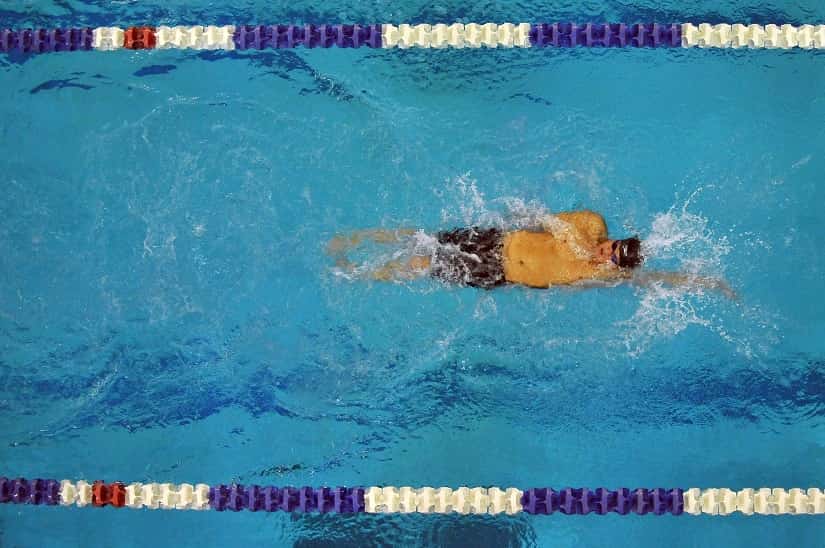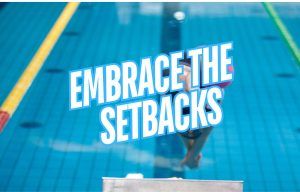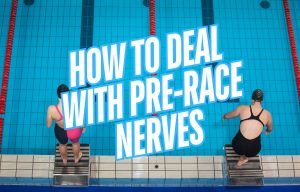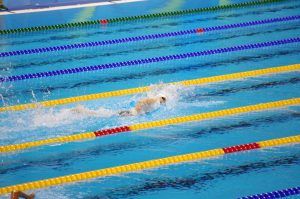
6 Benefits of Visualization for Swimmers
Wondering what visualization can do for your swimming? Here are some evidence-based benefits of visualization for swimmers for more confidence, less choking, and even better technique.

Ready to lay waste to your PB’s in 2018? Here’s why you should start with your mindset.
If you are like most people, you sat around on New Years and thought about the big things you wanted to accomplish this year:
For a lot of us, the goals for this year take the shape of best times, goal yardage, and overall mastery of our strokes and distances.
But for a lot fewer swimmers, the resolution is to have a better mindset.
Which is too bad, because just about everything in the pool, from your focus levels (affecting how technically-sound you swim), to your ability to suffer the pain and agony of training (predicting how hard you are going to train), to how well you are able to manage stress and arousal on race day (which affects how likely you are to “choke” or not), faster swimming starts and ends with the mental approach you take each day on deck.
Here’s five reasons that resolutioning yourself to a better mindset will help you crush whatever other goals you have in the pool this year:
Can you be more focused in practice? Can you push yourself a little harder in training? Can you execute your technique with a little more precision?
Of course you can.
Usually our first instinct when it comes to boosting these things is to get in “better shape.” Our thinking is that once we get in better shape, or hit that magical point where things are easier, than we can really start training better.
The problem with this line of thinking should be obvious: “better shape” is an ever-moving measuring stick. In two weeks you will tell yourself the same thing. And a couple weeks after that too.
A high-performance mindset is something you can start using immediately.
And yes, it’s harder—focusing on swimming with killer technique for the whole swim practice is tough. Pushing through when your lungs are screaming for air and your shoulders are tightening up is brutal.
But if you can drop a better mindset on your training these things become more automatic and habitual. The result is better practices, more often.
And what kind of impact do you think that will have on your swimming on race day? (Hint: it rhymes with “crushing personal best times.”)
I suspect that each of us has the “when I feel like it” swimmer within us.
It’s there when we get in the water and the main set is about to start (“I don’t feel that great in the water today, so I’ll swim with a measured effort during the main set”). It’s there when we have to do a lung-buster pull set (“I’m not good at breath discipline when swimming, so I’ll hold the breathing pattern when I’m better at it”).
A high performance mindset means you prepare the best you can for each practice, each day.
No matter how you “feel” in the water, what you feel like doing, or what stage of the training cycle is in. Because you don’t need the “I feel like it” box checked off before swimming, you will be able to put in better performances in practice.
And guess what—that mindset is mega handy in competition too. Just knowing that you trust yourself enough to prepare your best and swim your hardest when the meet isn’t going your way, or you are on your fifth race of the session can be a serious confidence booster.
The swim season is so long that it is a sure-fire inevitability that you will experience some serious setbacks along the way.
There is getting bed-ridden sick over the holidays with the flu. There’s the tweaks and outright injuries that are bound to happen (yeah, I’m looking at you shoulders), and of course, there are the performances where you collapse under pressure and expectation.
Setbacks and adversity happen to everyone and one of the major differences between elite swimmers and the nearly-elite is the outlook and mindset they have when things go south on them.
Get injured? It sucks. Got it. So what are you gonna do to train around it and make sure that you come back stronger than ever?
Get pummeled by your main competitor in your best race? Yup, it hurts. What are you gonna do to prepare between now and the next time you race them to level things up?
Adversity happens to every one of us in the pool. The difference is in the mindset (and the resilience) we choose to use moving forward.
Sacrilege, you say? Training is supposed to be hell, you snort? Nope. Training hard, pushing yourself, and swimming to the point that you are a collapsed mess hanging off the gutter can be enjoyable.
It doesn’t provide the same kind of satisfaction that you get from scratching your short-term gratifications (like me eating half a large pizza in seven minutes last week, for instance), but it gives you a warm sense of satisfaction, pride and confidence that lasts far beyond when the shame and regret kick in from those short term glories.
Working hard can be fun. Just not the same kind of “fun” that you get from giving into the fake-urgent needs of “taking it easy”, or eating fast food, or ditching out early on practice.
We’ve all had those head-scratching meets that leave our confidence in pieces: The hard work was there, the pace work in practice predicted big things, but when it came down to standing up on the block and throwing down on your PB, you laid a dud.
Cue those Debbie Downer thoughts from stage right: Am I just bad at this sport? Am I just destined to never improve? Maybe I’m not meant to be a faster swimmer?
When you lock down your mindset you learn to manage your anxiety and arousal levels in competition so that you can hit your ideal zone of performance that results in crazy-fast swimming.
Okay, you’re thinking, a high performance mindset is a good thing. Where do I even start?
There is plenty of material on this site that covers the topic. (Click here to view our archive of mental training articles.)
From battling back pre-race anxiety, to understanding the importance of being able to face up against adversity, to using self-talk to help boost our practices and racing skillz.
Additionally, if you want a complete tool to help you there’s also Conquer the Pool: The Swimmer’s Ultimate Guide to a High-Performance Mindset. It’s a workbook designed specifically for competitive swimmers to help them master their mindset from practice to podium.

Olivier Poirier-Leroy Olivier Poirier-Leroy is the founder of YourSwimLog.com. He is an author, former national level swimmer, two-time Olympic Trials qualifier, and swim coach.
✅ Free shipping on Orders over $49
✅ Price Match Guarantee
✅ Best selection of gear for training and competition
✅ Fast and Easy Returns

“This is the best book I have ever seen concerning mental training.” — Ray Benecki, Head Coach, The FISH Swim Team


Wondering what visualization can do for your swimming? Here are some evidence-based benefits of visualization for swimmers for more confidence, less choking, and even better technique.

Ready to uncork some best times at your next swim meet? Here’s what you need to know to prepare for a swim meet.

The right mental skills can help you unlock faster swimming on race day. Here is a look at the right skills to use for competition.

Frustrated with setbacks in the pool? Here are some tips for improving your ability to embrace setbacks and swim faster.

Struggling to swim fast under pressure? Here are some tips for how to manage pre-race nerves on race day.

Swimmers often find themselves stuck with doubt when it comes to doing tough things in the water. Here’s a simple question to ask when you find doubt and uncertainty stopping you from excellence.
SITE
SHOP
GUIDES

LANE 6 PUBLISHING LLC © 2012-2025
Join 33,000+ swimmers and swim coaches learning what it takes to swim faster.
Technique tips, training research, mental training skills, and lessons and advice from the best swimmers and coaches on the planet.
No Spam, Ever. Unsubscribe anytime.
